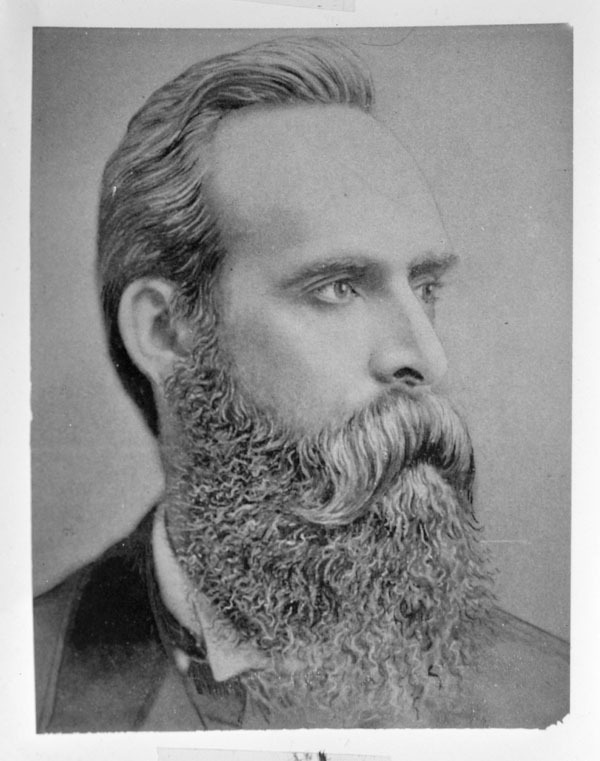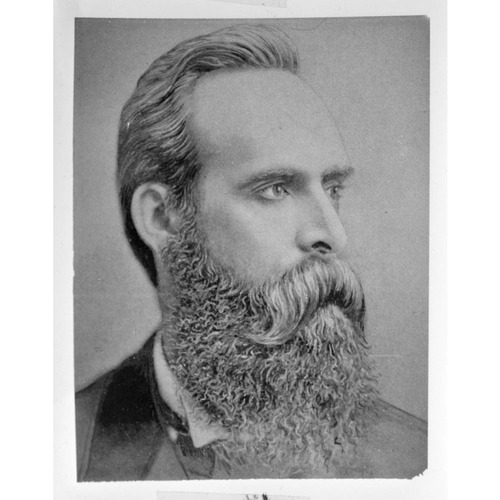EBY, CHARLES SAMUEL, Methodist missionary, author, and publisher; b. 3 Nov. 1845 in Goderich, Upper Canada, son of Jonas Eby and Hannah Fessant; m. 15 June 1871 Ellie (Nellie) Keppel in Brooklyn (New York City), and they had three daughters and three sons; d. 20 Dec. 1925 in Saskatoon.
Descended from Pennsylvania German stock, Charles Eby was converted when he was 11 at a camp meeting in Elora, Upper Canada, where his family had moved. At about 15 he began a two-year apprenticeship with a saddle and harness maker in Guelph while expanding his education. He then earned a teaching certificate, taught for a year near Guelph, and served as an exhorter in the local Wesleyan church.
At age 19 Eby began preaching, and in 1865 the annual conference of the Wesleyan Methodist Church in Canada permitted him to attend Victoria College in Cobourg as part of his probation for the ministry. After two years he travelled to Europe, where he studied German, French, and theology. He returned to Victoria in 1870 and graduated the following spring (dd 1886). Shortly thereafter he was ordained and married Ellie Keppel.
Eby served the Methodist German missions at Preston (Cambridge) and Paris, Ont., from 1871 to 1874 and those in Hamilton from 1874 to 1876. He visited all the German missions in Ontario, and lectured widely on his European travels in order to raise money for this work. Considered an excellent lecturer and a rousing preacher, he staunchly supported traditional evangelism. He began publishing the biweekly Der Canadische Evangelist [Canadian Evangelist] (Preston) in 1872 and personally maintained the journal until 1875 despite financial losses. The magazine was never well received, however, and his financial and propaganda campaigns outside the regular mission channels disturbed many itinerants.
In 1876 Eby was appointed to Japan, where the church had begun work in 1873 [see George Cochran*]. The mission authorities believed that his ardent zeal would spark a revival there as well as reawaken the Christian spirit in Canada. After learning basic Japanese, Eby opened a mission in Kōfu in 1878. Although conversions were initially rare, he attracted large crowds through his sermons and his lectures on Western religion and culture. He also helped to train a native Japanese ministry in Tokyo.
Strongly committed to evangelization, Eby considered that the real hindrance to Christian civilization came from the scepticism and secularism inherent in modern Western science and philosophy. For him, the best hope of success lay in attracting the brighter members of the samurai class by presenting Christianity as a logical ethical and moral system as well as a spiritual experience. In 1881–83 he published the Chrysanthemum (Yokohama), a monthly aimed at the Japanese intelligentsia but read mostly by the missionary community.
In early 1883 Eby delivered in Tokyo a popular series of lectures on Western theology and philosophy which was published in both English (Christianity and humanity) and Japanese. He credited these lectures with increased tolerance of Christianity by the Japanese authorities, and also with helping to promote a spiritual revival and making the Kōfu mission financially self-supporting. Another lecture in early 1884 appeared as The immediate Christianization of Japan: prospects, plans, results. On furlough in 1885–86, Eby undertook an exhausting North American tour to promote Methodist missions. In 1886 he presented an important lecture, published in Toronto as Methodism and the missionary problem, on the need to devote greater resources to overseas work. Before leaving Canada, he began a campaign for two projects that would dominate his remaining years in Japan.
Eby believed that the best way to convert Japan was to establish a large educational and social-relief mission near the Tokyo Imperial University where special lectures on Christianity could be presented. After modifications to accommodate traditional evangelism, regular church services, and a greater role for native Japanese workers, the Central Tabernacle opened in January 1891. In addition to running it, Eby published Japan for Christ, a journal outlining its work. In his second undertaking Eby, recognizing that the Board of Missions in Canada could not afford new recruits, called for “a supplementary force of self-supporting missionaries who, would work in harmony with the mission, and teach to pay expenses.” Fifteen men and one women were to work in Japan as part of this “light brigade” of Christian soldiers before it ceased operations in the early 1890s.
Most of Eby’s campaigns led to disputes. The Central Tabernacle spent more than one-eighth of the Japan mission budget, yet had little impact on the Japanese intelligentsia. Moreover, Eby proved to be a poor administrator, and his independent financial campaigns embarrassed the Board of Missions. Similarly, the board had no authority over the Self-Support Band, but feared it would have to pay the group’s expenses if anything went wrong. Eby had little regard for the wishes of others, and his relations with the Canadian Methodist authorities and the highly nationalistic native Japanese church were often strained. After his return to Canada in 1893 because of exhaustion, the controversies surrounding the Japan mission that he and his supporters had aggravated reached a climax. In late 1895 Eby and others were removed from the work there.
In 1896 Eby accepted an invitation to Homer Street Methodist Church in Vancouver, an institution with an active Japanese and Chinese membership. Three years later he moved to the similarly diverse Agnes Street Church in Toronto. Subsequently he held a variety of appointments, including Bracebridge (1903–5) and Kingston (1905–7). He then laboured for a year as secretary for eastern Asia of the International Reform Bureau, which opposed prostitution and the use of alcohol and opium. In 1908 he accepted a call from Zion Congregational Church in Toronto, and a year later he opened the People’s Institute, a socialist church advocating brotherhood, social action, and peace. After his wife’s death in 1912 he lived with a daughter in Saskatoon.
Eby was a man of rare talents, undoubted skills, and restless energy. He had a profound impact on the founding and early progress of the Methodist mission in Japan and did much to encourage Canadian support for mission work. He also strongly promoted ecumenism in church affairs, and strove to have Japan recognized as an equal member of the community of nations. As his obituary noted, he was a refined scholar, an impassioned preacher, and a courageous missionary.
Charles Samuel Eby’s Christianity and humanity: a course of lectures delivered in Meiji kuaido, Tokio, Japan and The immediate Christianization of Japan: prospects, plans, results were published in Yokohama in 1883 and 1884 respectively. Among his other works are How shall we preach Christ? ([Yokohama, 1885]); Jikken Shingaku/Experimental theology or, the Methodist standard of preaching, which he had printed in Japanese (Tokyo, 1888); The Forward Movement in Japan: an address to the Methodist Church (Toronto, 1889); and The world problem and the divine solution (Toronto, 1914).
UCC-C, Biog. file; Fonds 14/2/2, 78.083C; Fonds 14/2/4, 78.084C, 78.098C; Fonds 14/3/3, 78.092C. Christian Guardian, 1871–1908. G. H. Cornish, Cyclopædia of Methodism in Canada . . . (2v., Toronto and Halifax, 1881–1903). E. E. Eby and J. B. Snyder, A biographical history of early settlers and their descendants in Waterloo Township, with Supplement, ed. E. D. Weber (Kitchener, Ont., 1971). A. H. Ion, “Canadian missionaries in Meiji Japan: the Japan Mission of the Methodist Church of Canada (1873–1889)” (ma thesis, McGill Univ., Montreal, 1972). Methodist Church (Canada, Newfoundland, Bermuda), Missionary Soc., Annual report (Toronto), 1884–95; Woman’s Missionary Soc., Annual report (Hamilton, Ont.; Toronto), 1884–96. Methodist Church of Canada, Missionary Soc., Annual report (Toronto), 1874–84. G. R. P. and Howard Norman, One hundred years in Japan, 1873–1973 (2v., typescript, UCC, Div. of World Outreach, [Toronto], 1981). Neil Semple, The Lord’s dominion: the history of Canadian Methodism (Montreal and Kingston, Ont., 1996). Wesleyan Methodist Church in Canada, Missionary Soc., Annual report (Toronto), 1871–74.
Cite This Article
Neil Semple, “EBY, CHARLES SAMUEL,” in Dictionary of Canadian Biography, vol. 15, University of Toronto/Université Laval, 2003–, accessed July 17, 2025, https://www.biographi.ca/en/bio/eby_charles_samuel_15E.html.
The citation above shows the format for footnotes and endnotes according to the Chicago manual of style (16th edition). Information to be used in other citation formats:
| Permalink: | https://www.biographi.ca/en/bio/eby_charles_samuel_15E.html |
| Author of Article: | Neil Semple |
| Title of Article: | EBY, CHARLES SAMUEL |
| Publication Name: | Dictionary of Canadian Biography, vol. 15 |
| Publisher: | University of Toronto/Université Laval |
| Year of revision: | 2005 |
| Access Date: | July 17, 2025 |




